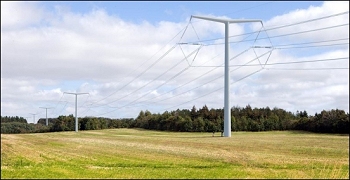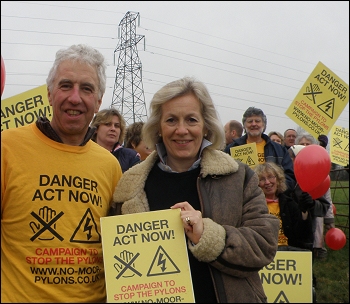Burnham-On-Sea’s MP has this week welcomed an announcement from National Grid that it will tear down pylons and remove electrical cables blighting some of the nation’s most highly treasured landscapes.
The £500 million budget for the works will be funded through levies on customers’ energy bills, adding an estimated 22 pence per year to a typical household’s bill.
In an unexpected admission, Chris Baines, Chairman of National Grid’s Stakeholder Advisory Group, said: “Undergrounding is best when you can do it.” He added that “a range of engineering measures could be implemented including the replacement of existing overhead lines with underground cables, the re-routing and screening from key public viewpoints of the lines.”
The comments come as residents in the Burnham area await the outcome of a Planning Inspectorate inquiry into National Grid’s plans to build 140 new pylons between Hinkley Point and Avonmouth, stretching along 34 miles of Somerset countryside and coming close to the villages of Mark, East Huntspill and Rooksbridge.
Tessa Munt said this week: “This announcement, whilst only about pre-existing pylons in National Parks and Areas of Outstanding Natural Beauty in England and Wales, is nonetheless very welcome.”
 “This marks a significant change in tone from National Grid. Those of us who have been campaigning on this issue for years must now seize this opportunity and push those holding the purse-strings to meet with us and listen properly this time.”
“This marks a significant change in tone from National Grid. Those of us who have been campaigning on this issue for years must now seize this opportunity and push those holding the purse-strings to meet with us and listen properly this time.”
“National Grid has acknowledged that into the future, it expects all cables will be placed underground or subsea. The company managed to underground every single cable in the Olympic Village, and in Germany and across much of Europe, laying cables underground is already the norm. Now National Grid has accepted the need to underground cables retrospectively in some of our most sensitive landscape areas.”
“The fact is thousands of tourists come to our beautiful part of the world each year, and our economy is heavily reliant on the beauty of our landscapes, which in itself must be valued.”
“I’ll continue to work with Parliamentary colleagues representing areas with similar fights on their hands to push National Grid, which could save everyone lots of trouble simply by laying cables underground from the outset.”







